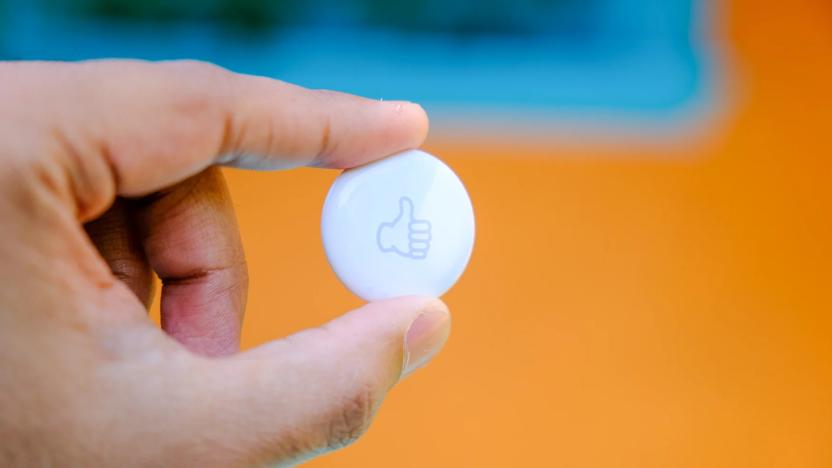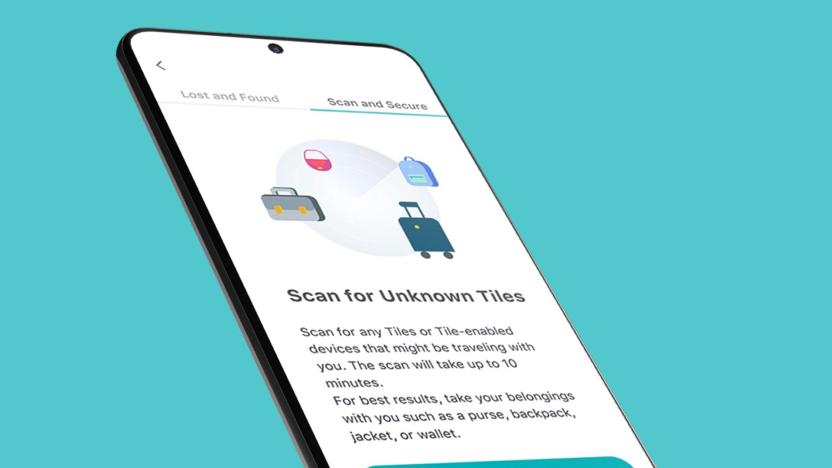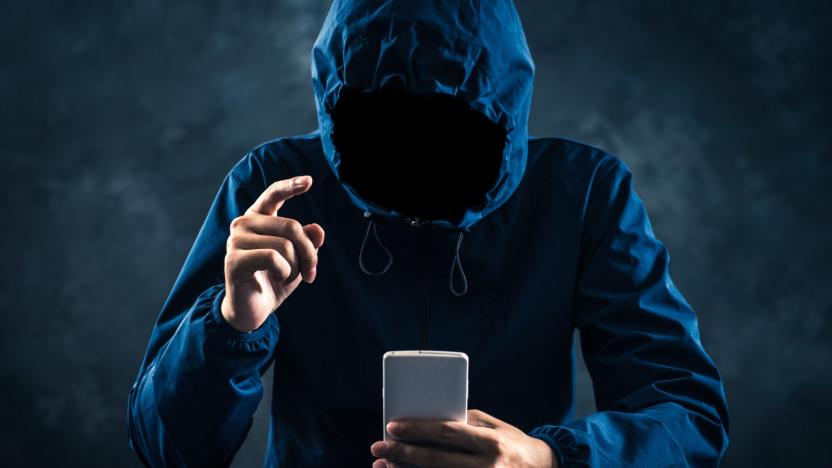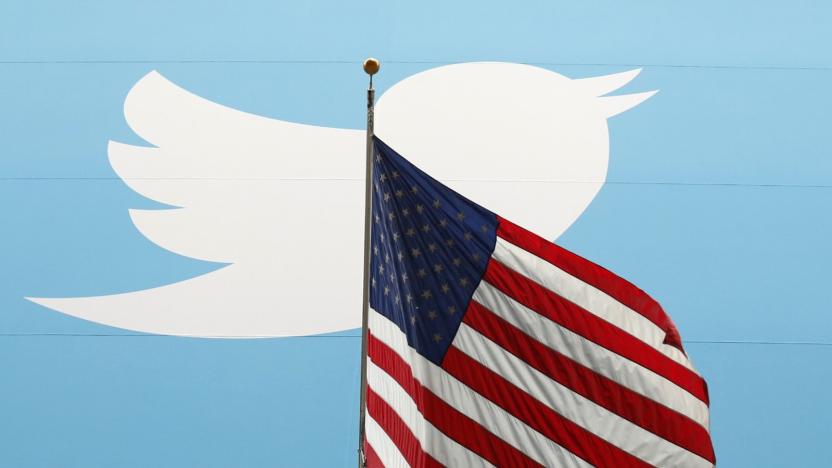stalking
Latest

Benevolent hackers clear stalking spyware from 75,000 phones
The WebDetetive breach compromised more than 76,000 devices, or more than 1.5 gigabytes of data freed from the server, according to the hackers. The spyware advertises the ability to monitor everything a victim types, listen to phone calls and track locations for "less than a cup of coffee" without being seen.

Google rolls out anti-stalking measures for AirTag and other Bluetooth trackers
Google’s anti-stalking measures are rolling out. The company’s unknown tracker alerts and other safety measures, announced at Google I/O in May, should start appearing on Android 6.0+ devices beginning today. The initiative aims to reduce the unfortunate rise in digital stalking that materialized soon after Apple’s AirTag launch in 2021.

Tile thinks a $1 million fine will deter stalkers from using its trackers
Tile is adding a new feature that makes its trackers harder for thieves to detect while floating heavy penalties for anyone using the feature to stalk victims.

Anonymous social app Yik Tak left users' precise locations exposed
The anonymous chat app Yik Yak had a flaw that let intruders get your precise location.

Police reports suggest a larger pattern of AirTag stalking
Fifty women in eight jurisdictions called the cops after discovering an unwanted tracker.

Tile will help you scan for unwanted tracking tags
Tile is joining Apple in helping detect unwanted tags stalkers and thieves might use to track you.

Apple removes Instagram stalking app Like Patrol from the App Store
Like Patrol -- an app that scrapes Instagram data to let users keep tabs on any Instagram account's interactions -- is in hot water. Instagram sent the app's developers a cease and desist notice last week for violating its terms of service, and on Saturday, Apple completely removed the service from the App Store. A quick search of the App Store confirms that it's no longer available as of this writing. According to CNET, Apple pulled Like Patrol after deciding it violated the App Store guidelines. Though it's not clear which rules were broken, it's a safe bet that they revolve around data collection and privacy violations.

Instagram is trying to shut down stalking app Like Patrol
Whether it's a parent checking in or a jealous boyfriend keeping tabs on his ex, stalkers are going to stalk. There are several apps that enable this type of behavior, and Like Patrol is one of them. The app scrapes Instagram data, allowing users to track who their targets interact with. According to CNET though, Instagram, sent a cease and desist order for violating its scraping rules, which will hopefully halt Like Patrol's ability to collect data, and force the publisher to shut down the app.

Google pulls stalking apps from the Play Store
It's one thing to voluntarily share your phone activities with friends and family, but some app developers have been encouraging far more sinister uses. Google has pulled multiple people-tracking Android apps from the Play Store after Avast discovered that they're largely meant to enable stalking. Once the would-be spy has physical access to the target's phone, they install a tracking app that collects sensitive details like location, text messages and call history. They even help snoops hide evidence of the apps -- you won't find icons or other telltale clues. After that, the stalker can watch their victim through a desktop.

A Bluetooth vulnerability could give hackers your location
Your Fitbit and other Bluetooth gadgets could be giving away your location data. Researchers from Boston University (BU) detected a vulnerability in several high-profile Bluetooth devices that could allow third-parties to determine your location and other sensitive information. In the wrong hands, that information could be used for stalking or abuse. That's especially concerning given that basically everyone is carrying around a Bluetooth device.

Minnesota cop receives $585,000 after fellow officers spied on DMV data
The city of Minneapolis is learning a hard lesson about the importance of placing checks on government data access. A court has awarded police officer Amy Krekelberg a total of $585,000 after she sued Minneapolis and two fellow officers for allegedly violating state law protecting the disclosure of DMV data. Krekelberg had discovered that people had arbitrarily accessed her DMV records almost 1,000 times over the course of roughly a decade. Dozens of the perpetrators were other police officers, and the behavior was frequently creepy -- some officers looked for her info late at night, while the two targeted in the lawsuit allegedly looked her up after she turned down their romantic offers.

Tesla accuses investor of harassing and stalking its workers
Tesla and Elon Musk haven't been fans of people short-selling company stock (earlier talk of going private was partly a response to that), but they apparently have extra reason to be worried about one short seller in particular. The EV maker has obtained a temporary restraining order against Randeep Hothi after accusing the man of routinely threatening its staff. He reportedly injured a security guard at Tesla's Fremont factory with his car in February after he was asked to leave the parking lot, and on April 16th stalked a Tesla-owned Model 3 for 35 minutes on the freeway to the point where he forced the car into a automatic emergency maneuver to avoid a collision.

DOJ demands Twitter account info following discussion of an agent
Law enforcement is often eager to protect its own, but it might have overstepped its boundaries in an online case. The Department of Justice has sent a subpoena to Twitter demanding complete account info for @popehat (Ken White), @pogowasright (Dissent Doe), @dawg8u (Mike Honcho), @abtnatural (Virgil) and @associatesmind (Keith Lee) after security researcher Justin Shafer mentioned them in a tweet. While the post itself is a single smiling emoji, the DOJ believes they support cyber stalking allegations against Shafer over his response to a questionable FBI raid on his home. It's a bit complicated, so we'll elaborate.

Online harassment keeps getting worse, study shows
Harassment is sadly an increasing inevitability on the internet with a new study showing that 41 percent of adults saying they've it experienced personally and 73 percent saying they've seen it happen to someone else. According to the Pew Research Center study, the most common form of online harassment is offensive name-calling, which has been personally experienced by 51 percent of men aged 18-24. Men in this age group were also more likely to have been purposefully embarrassed and physically threatened.

Guide helps you fight online harassment
Harassment may be a regular part of the modern internet landscape, but that doesn't mean that you have to simply sit there and take it. Feminist Frequency, which is all too familiar with harassment and threats, has posted a guide to protecting yourself against the onslaught of digital bullies, stalkers and trolls. In some ways, it's about observing common sense privacy and security policies: avoid sharing more personal info than necessary, use difficult-to-crack passwords and stay on guard against malware and other exploits.

Women, LGBT least safe on Facebook, despite 'real name' policy
Despite Facebook's insistence that its "real names" policy keeps its users safe, a new report reveals that Facebook is the least safe place for women online. And things are turning more explosive, as stories emerge that Facebook has been changing its users' names without their consent -- and the company isn't allowing them to remove their real names from their accounts. Meanwhile, a furious LGBT coalition has rallied around the safety threats posed to its communities by the policy. Though, it was unsuccessful in blocking the company from marching in America's largest gay pride parade. Facebook's ongoing war on pseudonyms became well-documented in 2011 when a blogger risking her life to report on crime in Honduras was suspended by the company, under its rule requiring everyone to use their real name on the social network. The problem re-emerged in September 2014 when Facebook's policy locked an eye-opening number of LGBT accounts in violation of the "real names" rule. Facebook met with Bay Area LGBT community representatives, offered an apology, then suggested a policy change was in the works. Surprise: It never came. Nine months later, Facebook has failed to solidify or clarify this policy, and one organization has bad news for Facebook's years of "real name" policy implementation.

Creepy Chrome extension shows where FB messages come from
Even though Facebook's mobile Messenger specifically tells you that it tracks your location data the first time you install the app (and every time you start a new conversation), most folks don't realize how often and how accurately it actually does so. In fact, the app pings your location each time you send a text. And with this new Chrome extension, you'll be able to see exactly where your contacts have been messaging you from -- without their knowledge or consent.

Foursquare builds a new ad business on your check-ins
Remember that time you battled a random stranger become the "mayor" of your local coffee shop on Foursquare? Don't worry if you don't, because Foursquare remembers and now it's going to use that data as part of Pinpoint, its new advertising solution. The platform will serve you ads across multiple apps, exchanges and publishers based on where you've been. According to Foursquare, "the places you go are the best indicator of who you are." It's like browser cookies but in the real world. It's also a bit like someone is following you around town to serve ads. In addition to where you've been, the company's Place Attribution Report helps brands determine if their ads succeed in sending you to real-world locations. So when launch partner Wild Turkey Bourbon serves you an ad about its booze and you check into a bar a few days later, everyone will be ecstatic that the system works. Well, everyone but you.

Crackdown on spying apps leads to StealthGenie CEO's arrest
Apparently, the US government is now on a mission to bring down mobile applications offering spyware services -- which, for a variety of well-documented reasons, simply seems kind of ironic. Controversy aside though, the Department of Justice revealed today that Hammad Akbar, CEO of StealthGenie, had been arrested in Los Angeles and charged with conspiracy, advertisement of a known interception device, advertising a device as a surreptitious interception device and sale of such a device. StealthGenie, which had been available on iOS, Android and BlackBerry, was known for providing an app capable of monitoring someone's calls, texts and photos, as well as tracking their location and more. StealthGenie wasn't shy about doing that either; a quick glance at a StealthGenie promotional video, found after the break, sums up the ideals behind the application and the consumers it targeted.

IMDb's latest iOS update makes it easier to follow movie stars without getting arrested
Whatever happened to Joe Carnahan after he directed the 2002 cop classic, NARC? And what the heck is Joaquin Phoenix up to these days (aside from deeply inappropriate love affairs)? The redesigned IMDb app for iOS 7 delivers answers to these questions and more, especially now that it supports shareable "People Lists" that allow you to track the careers of actors, directors, cinematographers and pretty much anyone else who tends to work on good movies. It's slightly tricky to figure things out at first: you have to sign in to the app, create a list and then change the list's type from "Title" to "Name" before it'll let you track individuals. The app also seems to lack the ability to trigger notifications when someone in your list starts work on a new film. Nevertheless, it all works smoothly once you get the hang of it and, if we'd had this feature sooner, we might well have paid more attention to the 2010 remake of The A-Team.











